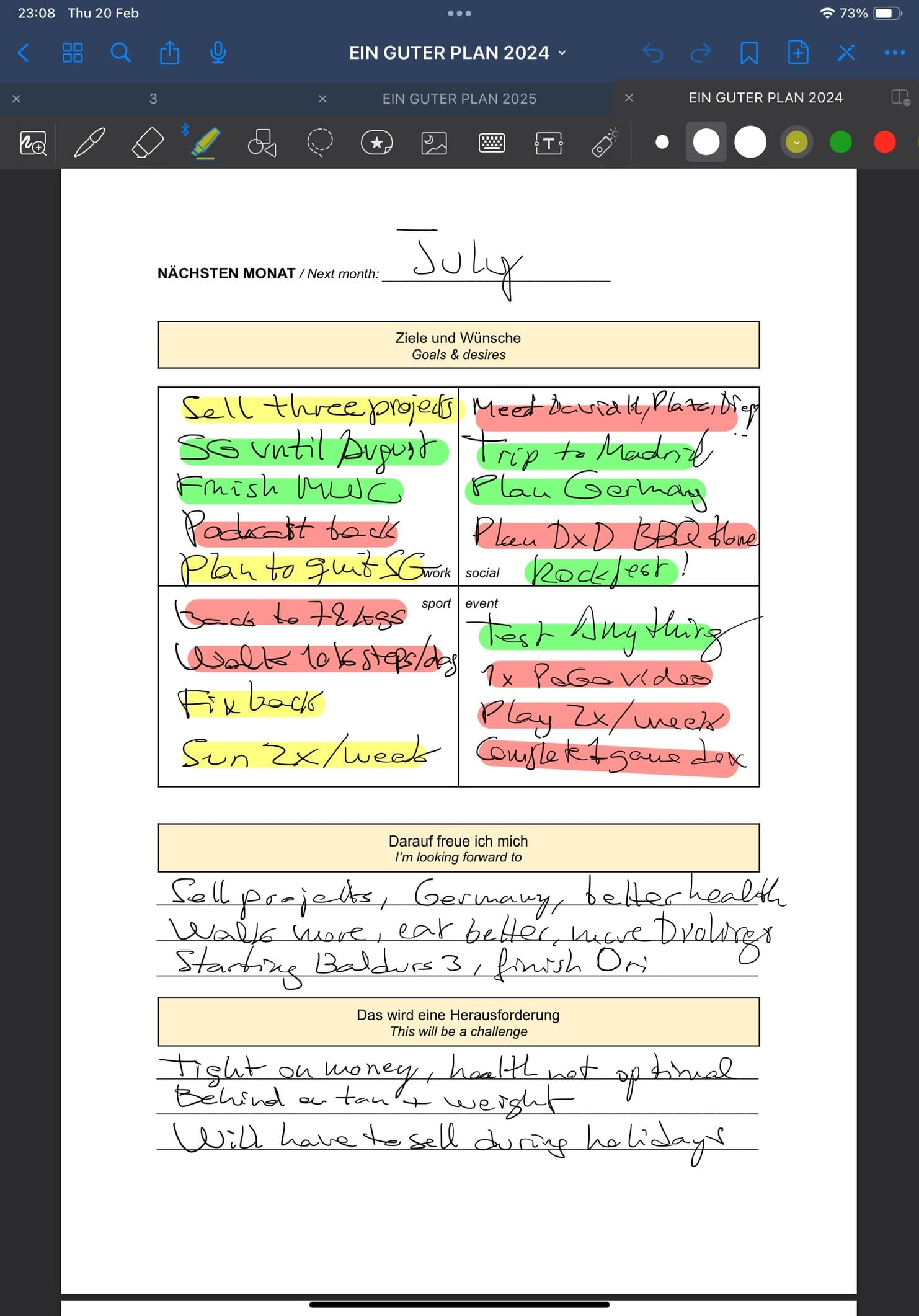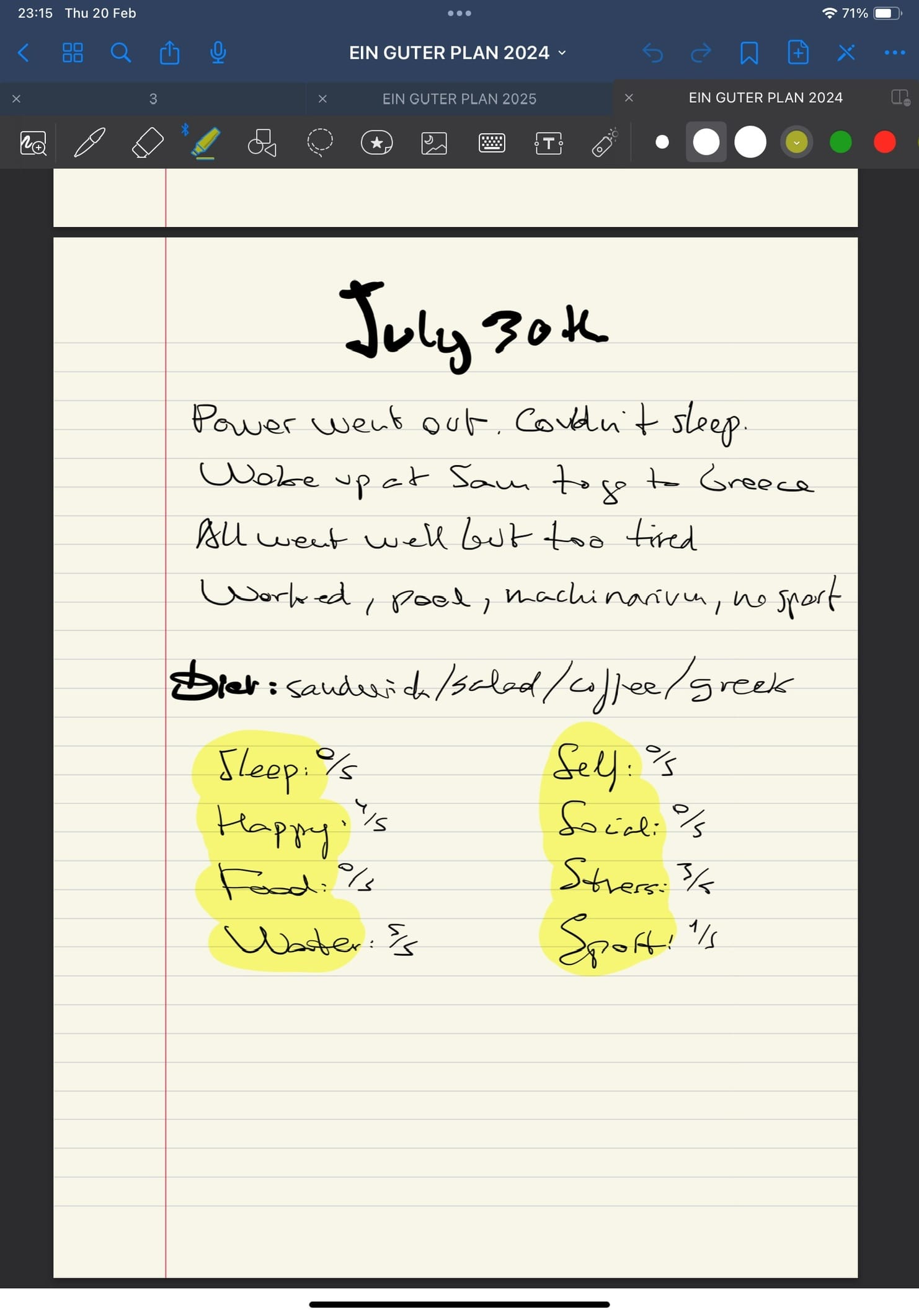F2F #25: Four years of journaling
I have learnt a few things outside of the obvious ones when it comes to journaling. You won't see this post on LinkedIn.

When I was a kid, I used to write a journal at school. I barely have any recollection of doing it, but I did keep my journals until a few years ago. I digitised them and threw them away during the pandemic when I went minimalist.
Around the same time, in January 2021, I bought Ein Guter Plan for one of my best friends. Turns out, in doing so, I rekindled the flame I had in me to write more, so I got myself a copy, too.
Ein Guter Plan is a sort of sophisticated diary (I have just learnt the difference between a journal and a diary). It helps you to review your life, year to year, and also to keep track of your personal progress over the weeks and days.
I started writing it on January 1st 2021 and haven't stopped since. Four years later, I have learnt a few things that I wanted to share with you.
Hopefully, they're not the typical BS you encounter on LinkedIn.
#1: Don't follow the framework blindly
A mistake most of us make 100% of the time is to commit to the framework (journaling, pomodoro, crossfit, etc.) without questioning if everything they say makes sense to you. That might be counter-productive but also dangerous.
On the one hand, it might be counter-productive if you try to do too much at once and adopt a radical change in your life. It's easy to feel overwhelmed by going all-in on a new technique, and some people will give up if they can't adopt it entirely, in an all-or-nothing approach. Overdoing habits is a surefire way to experience habits burnout.
On the other hand, it can be dangerous. Imagine that you adopt a diet that isn't good for your body, or a kind of exercise that is good for pretty much everyone (but not for you). You will end up hurt or with long-lasting problems.
Make sure you adapt the framework to your needs when something is unreasonable or unhealthy.
#2: The chain trap
Most habit apps overdo the whole gamification thing. Duolingo is well-known for its streaks.
Streaks are great for building habits. The myth says that it takes 21 days to build a habit, but there's nothing set in stone with enough scientific evidence. In fact, long after I built the habit with Duolingo, I found myself tricking the system every night just to extend the streak, thus beating the purpose of the app. Instead of learning more, I was just gaming the system because it incentivises you to build a long chain, not to learn new things every day.
And that is why I maintain that Duolingo isn't a languages app. It's a habits app, or even a game.
So, do it healthily. Writing a diary (or a journal) is good if you do it consciously every day, but it's OK to skip a day or two. A meaningful day is worth more than a week where you only do it to tick the box.
#3: You have to have a plan
Only last week I realised that I was just writing my diary for the sake of writing a diary. I don't remember my initial goal anymore.
Every month, there is a "monthly goals" page that you have to write on the first day of the month, and go back to it at the end of it. I realised that I rarely ever set the tasks in my Todoist, so I end up forgetting about them.

I also don't track correlations between days logged as "bad sleep" and mood and stuff like that. I don't think I will ever go back to the page from February 21st, 2022, and see how I was feeling or what I was doing, so I don't put a lot of thought into it other than just dumping my brain.
What's the point, then?
There's no motivation without intention.
#4: Your diary is a reflection of your mind
Going back a few pages, I always end up seeing how I was feeling that day. Not because I write how I feel - I don't - but because my handwriting is rushed, lazy, sparse on words or the messages I write show that I am nervous, angry or depressed.
My rule here is: we all have bad and good days but if one state of mind lasts for more than a few days, it requires attention.
A weekly review of the past week will help to uncover issues that need to be dealt with.
#5: Will AI help me with this?
There are a lot of apps out there that help you log your life. I have tried Gyroscope and I am still thinking I ought to write my own version of this app (but I know I shouldn't).
I write my diary on my iPad using Goodnotes. I handwrite every page, which in and of itself is challenging for AI, as my handwriting is already clunky on paper, so you can imagine that it’s even worse on a screen, even if the Apple Pencil grip is pretty darn good.
I am not very confident that there is a model capable of identifying my shitty handwriting, my scribbling, my jargon or made-up words but I like to fantasize about it and dream of one day being able to ingest thousands of pages of my diary into my own version of Samantha from HER.

Recommended content
- 🎙️ Mr. Beast shares his best business advice on the My First Million podcast.
- 📖 Myths about habits.
- 📖 Check out Barcinno's 2025 Mobile World Congress & 4YFN Parties & Events Guide.
- 🛠️ Amazon’s killing a feature that let you download and backup Kindle books.
- 🛠️ Ivan Landabaso (JME) has built a pitch coach using AI.
- 🛠️ Superhuman unveils Superhuman AI.
- 📅 There is going to be a CTO meeting at 4YFN next month!
My projects
- 📅 We have helped to put together this year's Talent Arena too, at MWC. Come join us and learn from Woz!
- 📅 More than 50% of the tickets for the Corporate Innovation Summit are gone. Get yours.
- 👽 We're hiring a Project Manager for MarsBased.
- 🎙️ Is M&A really back this year? Life on Mars with Clemens Rossberg.
- 🎙️ Foc a terra: Tots tenim un pla fins que ve un colom i s'hi caga (in Catalan).
As always, thanks for reading and send this to anyone you think might like it! Send me feedback as well to keep improving.